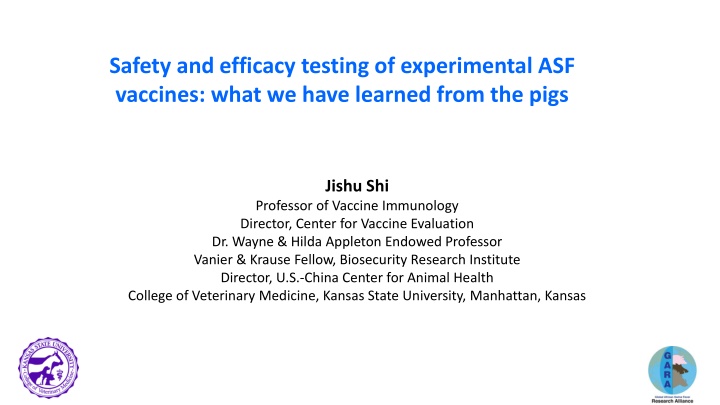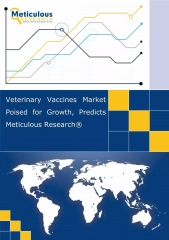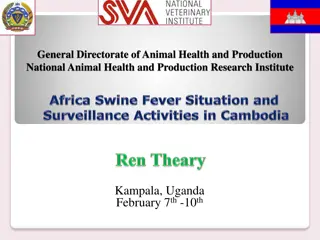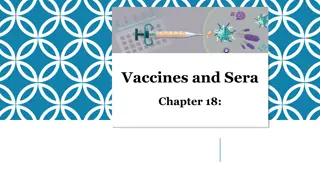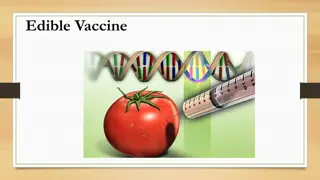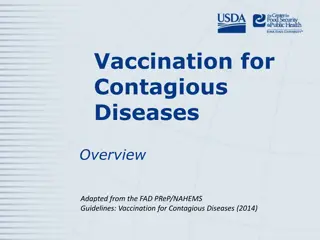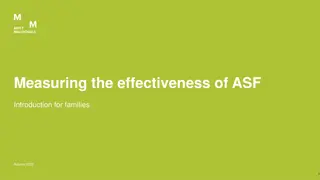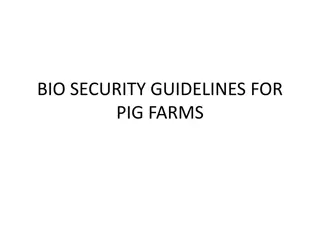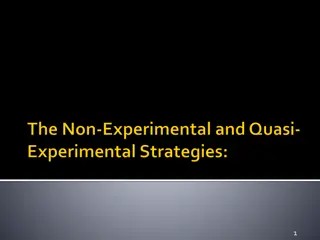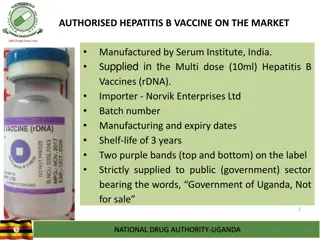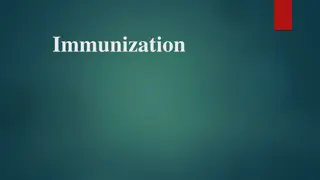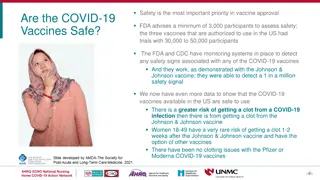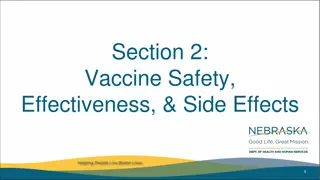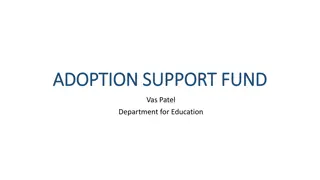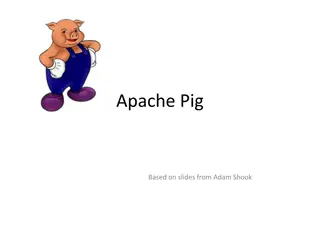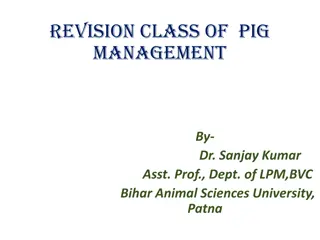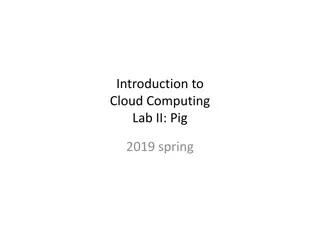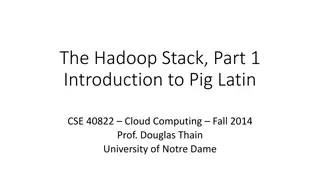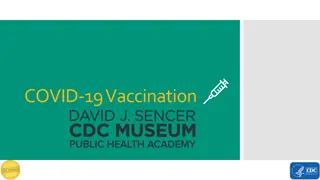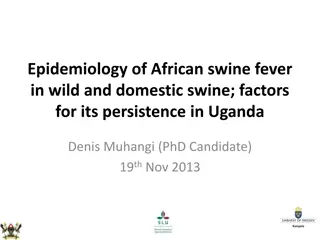Insights on Experimental ASF Vaccines in Pig Studies
The research conducted by Prof. Jishu Shi and his team at Kansas State University delves into the safety and efficacy testing of experimental African Swine Fever (ASF) vaccines using pigs as the model. Various vaccines, including DNA vaccines and live attenuated viruses, were tested against different ASF virus genotypes. The study compares the virulence of ASFV OURT88/1 and ASFV Vietnam19, revealing significant differences in survival rates and viremia levels post-challenge. The experimental design outlines the subunit vaccine study with detailed timelines and procedures.
Download Presentation

Please find below an Image/Link to download the presentation.
The content on the website is provided AS IS for your information and personal use only. It may not be sold, licensed, or shared on other websites without obtaining consent from the author.If you encounter any issues during the download, it is possible that the publisher has removed the file from their server.
You are allowed to download the files provided on this website for personal or commercial use, subject to the condition that they are used lawfully. All files are the property of their respective owners.
The content on the website is provided AS IS for your information and personal use only. It may not be sold, licensed, or shared on other websites without obtaining consent from the author.
E N D
Presentation Transcript
Safety and efficacy testing of experimental ASF vaccines: what we have learned from the pigs Jishu Shi Professor of Vaccine Immunology Director, Center for Vaccine Evaluation Dr. Wayne & Hilda Appleton Endowed Professor Vanier & Krause Fellow, Biosecurity Research Institute Director, U.S.-China Center for Animal Health College of Veterinary Medicine, Kansas State University, Manhattan, Kansas
12 ASF vaccine animal studies and 320 pigs 2019-2022 Experimental Vaccines: DNA vaccines Subunit vaccines Gene-deleted mutants Live attenuated viruses ASF Viruses: Georgia 2007 (Genotype 2) Vietnam 2019 (Genotype 2) OURT88/1 (Genotype 1) Objectives of Animal Studies ASFV virulence titration Vaccine safety Vaccine efficacy Challenge dose: IM, 0.1-100 HAD50 Pigs: 3-6 weeks old, female, from commercial farms Biosecurity Research Institute, Kansas State University
Is ASFV OURT88/1 more virulent than ASFV Vietnam19? Challenge dose: 100 HAD50/pig; IM/contact = 1/2; 10 weeks old pigs 2/6 pigs survived (DPC21) the IM challenge with ASFV Vietnam19 (Ct35 & Ct39); 0/6 pigs survived (DPC21) the IM challenge with ASFV OURT88/1. 4/12 pigs survived the contact challenge with ASFV Vietnam19. ASFV viremia in these pigs were very low (Ct34-38) on DPC21. 4/12 pigs survived the contact challenge with ASFV OURT88/1. However, ASFV viremia in these pigs were very high (Ct19-20) on DPC21.
Experimental Design: Subunit ASF vaccines BioApp ASF Pig Study Outline Timeline 3-week-old female pigs = pig groups with 6 pigs LARC vaccination phase BRI ASFV challenge phase End of Study 2 weeks D49/ DPC14Shi 21-36 3 weeks 2 weeks D35/ DPC0 3 weeks D0 D21 D56/ DPC21 Shi 21-38 Dose 2 Dose 1 Challenge: ASFV Necropsy Transport pigs to BRI At Day 32 Blood Collection and Weight: Day 0, 7, 14, 21, 28, Day 35/DPC0, Day 38/DPC3, Day 42/DPC7, Day 45/DPC10, Day 49/DPC14, Day 53/DPC18, Day 56/DPC21 Temperature: Day 33/DPC -2 to Day 49/DPC14 or Day 56/DPC21
Subunit Vaccine Example #1 18 pigs with 3 pig groups vaccinated group 1 + ASFV 6 pigs: 2 i.m. 100 HAD50ASFV injected + 4 contact pigs vaccinated group 2 + ASFV 6 pigs: 2 i.m. 100 HAD50ASFV injected + 4 contact pigs non-vaccinated (PBS) group + ASFV 6 pigs: 2 i.m. 100 HAD50ASFV injected + 4 contact pigs 1 PBS pig and 1 Vax2 pig did not make it to challenge phase = 16 pigs in challenge phase
Pigs vaccinated with subunit vaccine Vax1 were protected from contact challenge with ASFV-Vietnam19
Pigs vaccinated with subunit Vax1 did not develop viremia after contact challenge with ASFV-Vietnam19
12 ASF vaccine animal studies and 320 pigs 2019-2022 Experimental Vaccines: DNA vaccines Subunit vaccines Gene-deleted mutants Live attenuated viruses ASF Viruses: Georgia 2007 (Genotype 2) Vietnam 2019 (Genotype 2) OURT88/1 (Genotype 1) Objectives of Animal Studies ASFV virulence titration Vaccine safety Vaccine efficacy Challenge dose: IM, 10-100 HAD50 Pigs: 3-6 weeks old, female, from commercial farms Biosecurity Research Institute, Kansas State University
What an ideal ASF vaccine should look like? Classical swine fever vaccines Modified live virus (MLV) vaccines: C-strain (DIVA compatible) Subunit: E2 based subunit vaccines (DIVA)
Acknowledgement Dr. Franco Matias-Ferreyra Dr. Rachel Madera Dr. Lihua Wang Dr. Kelli Almes Dr. Quang Lam Truong at VNUA Dr. EunJu Sohn Dr. Hyangju Kang Dr. Ju Hun Kim BioApp Dr. Ningning Ma Dr. Jinan Huang DingChi Nina Muro Jimena Kilian Heather George Aidan Craig Funding Sources (2012-2023) NBAF Transition Fund BioApp, DingChi Animal Health Industry USDA ARS, USDA FAS USDA NIFA, DHS Dr. Manuel Borca Dr. Douglas Gladue Dr. Cyril Gay USDA ARS Dr. Linda Dixon Pirbright Institute Yuzhen Li Isabelle Kloss Amanda Rezac Ian Hallenbeck
Partnership in ASF Vaccine Development for Africa Unmet need: Most current experimental ASF vaccines are being developed for Asian countries (genotype II) Objective: A partnership to develop ASF vaccines specific for African countries We are looking for partners in ASF research and vaccine development for Africa Contact: Jishu Shi Professor and Director Center for Vaccine Evaluation College of Veterinary Medicine, Kansas State University 1620 Denison Avenue, Manhattan, KS 66506, USA WhatsApp: +17854776977 Email: jshi@ksu.edu or jishu.shi@fao.org
ASF Subunit Vaccine Consortium Members/Stakeholders: ASF vaccine researchers and sponsors What we do: share information on ASF subunit vaccines that did not induce protective immunity in pigs Objective: Reduce the waste of research efforts, time, and funds on ASF vaccine development Contact: Jishu Shi Professor and Director Center for Vaccine Evaluation College of Veterinary Medicine, Kansas State University 1620 Denison Avenue, Manhattan, KS 66506, USA WhatsApp: +17854776977 Email: jshi@ksu.edu or jishu.shi@fao.org
GARA 2023 Asia ASF Workshop (Beijing, September 17-20, 2023) The U.S.-China Center for Animal Health at Kansas State University will partner with the Global African Swine Fever Research Alliance (GARA) and Chinese Veterinary Drug Association (CVDA) to host the GARA Scientific Workshop in Beijing on September 17-20, 2023. This ASF workshop is supported by a grant from the USDA Foreign Agriculture Service (FAS) and USDA Agricultural Research Service (ARS). The objective of this workshop is to provide a platform for the best ASF researchers around the world to get together and share their knowledge and expertise on ASF control and prevention. Working with GARA, CVDA, and USDA ARS, we plan to invite 20 ASF researchers from China and 20 ASF researchers outside China. The attendees will meet in Beijing to: 1. discuss ASF Research in China/Asia and around the world, and identify knowledge gaps and opportunities for future collaboration; 2. share the lessons and experiences learned from China and other Asian countries, especially 1) what we would do differently in the last fours years had we known in July 2018 how ASF would spread in China/Asia? 2) what types of research are needed in order to have more effective tools and resources for ASF control and prevention in Asia, Africa, and Europe? 3. foster ASF research collaborations among meeting attendees in areas of vaccine development, diagnostic tool evaluation, and epidemiology training.
